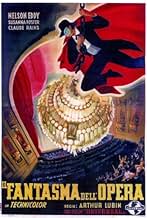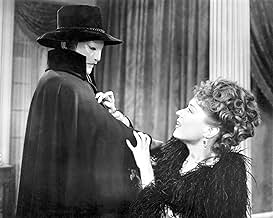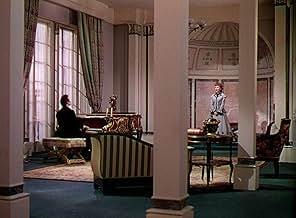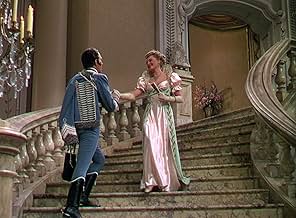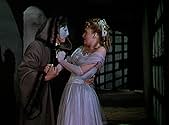IMDb RATING
6.4/10
8.9K
YOUR RATING
An acid-scarred composer rises from the Paris sewers to boost his favorite opera understudy's career.An acid-scarred composer rises from the Paris sewers to boost his favorite opera understudy's career.An acid-scarred composer rises from the Paris sewers to boost his favorite opera understudy's career.
- Won 2 Oscars
- 3 wins & 5 nominations total
Kate Drain Lawson
- Landlady
- (as Kate Lawson)
Featured reviews
The Phantom Of The Opera is a 1943 adaptation of the classic novel of the same name, directed by Arthur Lubin and starring Claude Rains, Susanna Foster and Nelson Eddy.
I think I'm not alone when I say that the best part of this film is the gorgeous and colorful cinematography and beautiful sets and costumes which make this a visually outstanding film however aside from this I think it is very forgettable.
The acting is OK and that's really it, even Claude Rains, one of the greatest actors of all time isn't particularly memourable in this film. I'm also not the biggest fan of the movie's tone, it just feels too light hearted and almost goofy, ruining most of the suspense, at least for me.
6.8/10
It's perfectly true that this version isn't Lon Chaney and is watered-down Leroux, but it still has excellent performances and - this was during WW II remember - extraordinarily beautiful production values which resulted in Oscars for Color Cinematography and Art/Set Decoration. I've loved this film since I was a kid, even though back then I had to endure black-and-white telecasts because the local CBS affiliate was unable to obtain a color print that was up to their standards - years later I was lucky enough to see it - twice! in a theatre - as gorgeous as the color is on the DVD, it was even more breathtaking on the big screen. The extra features (the documentary "Phantom Unmasked", which includes a rare interview with the elusive Susannah Foster, and the audio commentary) have only increased my pleasure in watching this film over and over again.
When Universal decided to remake Lon Chaney's classic silent version of the opera, sound opened up a rather obvious vista for the film. We can make it as much about opera as the phantom haunting the Paris Opera.
A task rendered considerably easier by the presence of Nelson Eddy and Susanne Foster. Unlike his screen partner at MGM, Jeanette MacDonald, Nelson Eddy came from the opera to the cinema. He always viewed himself as a singer first, films were something he did to get publicity for his concert tours. But Eddy always loved the grand opera, it could easily been his career path. Consequently The Phantom of the Opera and the arias he sings here always had a special place in his affections. We see a lot of the real Nelson here.
Another one of his interests was sculpture. The bust of Susanna Foster that Claude Rains stole from Eddy's dressing room is something that Nelson Eddy actually did. Sculpting was a hobby of his and as you can see he was quite good at it. Might have made a living doing that as well.
Susanna Foster who had a lovely soprano voice gave up her career soon after this most acclaimed of her films. A pity too, it was a real loss to the screen.
This Phantom of the Opera has a bit of comedy in it as well. Baritone Nelson Eddy and Inspector of the Surete Edgar Barrier have an uneasy rivalry going for the affections of Foster. The scenes involving this are nicely staged by director Arthur Lubin, more known for doing Abbott and Costello comedies.
This may have been Edgar Barrier's best film role. He was a more than competent player, his career probably suffering because he was a bit too much like Warren William who was himself a poor man's John Barrymore. Barrier played equally well as villains or as a good guy as he is here. Another fine role for him even though he only has one scene is in Cyrano de Bergerac where he plays the very sly and all knowing and discerning Cardinal Richelieu.
Of course Phantom of the Opera is really made by the performance of Claude Rains as the mild mannered, inoffensive Eric Claudin, a violinist in the Paris Opera who is crushing out big time on Susanna Foster. We see him first being told after 20 years he's being given the sack by the company. What they describe sounds an awful lot like Carpel Tunnel Syndrome that he's developed which is affecting his playing the violin. Bad news for Susanna Foster also because he's been her secret benefactor in paying for voice lessons.
There isn't any middle aged man who doesn't identify with Rains. Tossed out of his job, the rent due, crushing out big time on a young girl, a lot of us have been there. Then when he thinks an unscrupulous music publisher is stealing a concerto he's written, he loses it completely and kills him. And when acid is thrown in his face disfiguring him, it's a short journey to madness.
Rains really makes us feel for Claudin. In that sense the film is not a horror picture in that we're dealing with monsters or unworldly creatures that Universal so specialized in. The man who becomes the Phantom is all too real, too human, and if we're pushed right, could be any one of us.
Can you do better than opera arias by Nelson Eddy and a classic performance by Claude Rains? I think not.
A task rendered considerably easier by the presence of Nelson Eddy and Susanne Foster. Unlike his screen partner at MGM, Jeanette MacDonald, Nelson Eddy came from the opera to the cinema. He always viewed himself as a singer first, films were something he did to get publicity for his concert tours. But Eddy always loved the grand opera, it could easily been his career path. Consequently The Phantom of the Opera and the arias he sings here always had a special place in his affections. We see a lot of the real Nelson here.
Another one of his interests was sculpture. The bust of Susanna Foster that Claude Rains stole from Eddy's dressing room is something that Nelson Eddy actually did. Sculpting was a hobby of his and as you can see he was quite good at it. Might have made a living doing that as well.
Susanna Foster who had a lovely soprano voice gave up her career soon after this most acclaimed of her films. A pity too, it was a real loss to the screen.
This Phantom of the Opera has a bit of comedy in it as well. Baritone Nelson Eddy and Inspector of the Surete Edgar Barrier have an uneasy rivalry going for the affections of Foster. The scenes involving this are nicely staged by director Arthur Lubin, more known for doing Abbott and Costello comedies.
This may have been Edgar Barrier's best film role. He was a more than competent player, his career probably suffering because he was a bit too much like Warren William who was himself a poor man's John Barrymore. Barrier played equally well as villains or as a good guy as he is here. Another fine role for him even though he only has one scene is in Cyrano de Bergerac where he plays the very sly and all knowing and discerning Cardinal Richelieu.
Of course Phantom of the Opera is really made by the performance of Claude Rains as the mild mannered, inoffensive Eric Claudin, a violinist in the Paris Opera who is crushing out big time on Susanna Foster. We see him first being told after 20 years he's being given the sack by the company. What they describe sounds an awful lot like Carpel Tunnel Syndrome that he's developed which is affecting his playing the violin. Bad news for Susanna Foster also because he's been her secret benefactor in paying for voice lessons.
There isn't any middle aged man who doesn't identify with Rains. Tossed out of his job, the rent due, crushing out big time on a young girl, a lot of us have been there. Then when he thinks an unscrupulous music publisher is stealing a concerto he's written, he loses it completely and kills him. And when acid is thrown in his face disfiguring him, it's a short journey to madness.
Rains really makes us feel for Claudin. In that sense the film is not a horror picture in that we're dealing with monsters or unworldly creatures that Universal so specialized in. The man who becomes the Phantom is all too real, too human, and if we're pushed right, could be any one of us.
Can you do better than opera arias by Nelson Eddy and a classic performance by Claude Rains? I think not.
Anybody approaching 'Phantom Of The Opera' as a horror movie will probably be disappointed, but if you look upon it as a romantic melodrama it's pretty entertaining. The sets (mostly recycled from the twenties version) are lavish, the music is strong and the performances are good, especially the wonderful Claude Rains ('The Invisible Man', 'Casablanca', 'Notorious') who is excellent (as always). The rest of the cast includes songbirds Nelson Eddy and Susanna Foster, the late Hume Cronyn in a bit part, and a nice cameo from Fritz Leiber (the father of the famous science fiction and fantasy writer Fritz Leiber, Jr) as Franz Liszt. 'Phantom Of The Opera' is far from my favourite Universal horror movie but I still enjoyed it and it's worth watching, though I think in many ways the Hammer remake in the 1960s starring Herbert Lom is a better movie.
Poor old Enrique Claudin doesn't have much luck – and what he does have is all bad. An adept but unremarkable violinist with the Paris Opera House, he secretly worships Christine Dubois, the young understudy to the snooty leading songstress, and even goes so far as to anonymously spend all his money on singing lessons for her even though she is barely conscious of his existence. Enrique loses his job when he starts losing the feeling in his fingers. Then he mistakenly believes the musical manuscript he has been working on has been stolen by no less a light than Franz Liszt (Lord only knows how he wandered into this). Gripped by a violent rage, Enrique throttles the bad-tempered music publisher who prevents him from retrieving his manuscript and ends up with a face full of acid courtesy of the publisher's panicky secretary. Evading capture by the police, Enrique hides in the sewers beneath the Opera House and, like a tomato that's rolled under the cooker, grows dark and warped in the darkness.
Gaston Laroux's Phantom of the Opera is one of those stories that filmmakers feel compelled to retell every couple of years, so there's not a great deal to set this apart from all those other versions. Universal's use of colour is uncharacteristically sumptuous, and given that this tale falls nominally into the horror category for which they were famed, it stands by comparison to their other output of the time as something of a prestige production. There's not really much horror to speak of – although, by modern standards, none of the 40s horror films are likely to scare anyone over the age of five, so it's not out of the ordinary there. In fact it would arguably be more accurate to describe it as a musical given the amount of time that's given over to opera numbers that do little other than pause the action.
Claude Rains gives a typically polished performance as the tormented Claudin, although the failure of the script to get under his character's (scorched) skin once he assumes the identity of the Phantom leaves the actor with little to work with once he dons the mask and descends into B-movie madness. Nobody else in the cast really stands out. Susanna Foster makes a rather unmemorable ingénue (who shows worrying indications of following the same path as the prima donna she replaces given the way some of their lines are nearly identical), and leaves you wondering why poor old Claudin got so hot and bothered over her in the first place. Nelson Eddy and Edgar Barrier provide some light relief as the troupe's baritone and the investigating police officer, both of whom also fall under Miss Foster's mysterious spell.
Phantom of the Opera provides a good example of 40s Hollywood expertise (although it looks more like an MGM film than a Universal), and is entertaining enough even though it rarely provides anything that's likely to stick in the mind. Arthur Lubin at least attempts moments of artistry – for example by having the camera repeatedly passing sources of light – candelabras, chandeliers, etc – to suggest the fatal fascination Claudin's object of unrequited love holds for him.
Gaston Laroux's Phantom of the Opera is one of those stories that filmmakers feel compelled to retell every couple of years, so there's not a great deal to set this apart from all those other versions. Universal's use of colour is uncharacteristically sumptuous, and given that this tale falls nominally into the horror category for which they were famed, it stands by comparison to their other output of the time as something of a prestige production. There's not really much horror to speak of – although, by modern standards, none of the 40s horror films are likely to scare anyone over the age of five, so it's not out of the ordinary there. In fact it would arguably be more accurate to describe it as a musical given the amount of time that's given over to opera numbers that do little other than pause the action.
Claude Rains gives a typically polished performance as the tormented Claudin, although the failure of the script to get under his character's (scorched) skin once he assumes the identity of the Phantom leaves the actor with little to work with once he dons the mask and descends into B-movie madness. Nobody else in the cast really stands out. Susanna Foster makes a rather unmemorable ingénue (who shows worrying indications of following the same path as the prima donna she replaces given the way some of their lines are nearly identical), and leaves you wondering why poor old Claudin got so hot and bothered over her in the first place. Nelson Eddy and Edgar Barrier provide some light relief as the troupe's baritone and the investigating police officer, both of whom also fall under Miss Foster's mysterious spell.
Phantom of the Opera provides a good example of 40s Hollywood expertise (although it looks more like an MGM film than a Universal), and is entertaining enough even though it rarely provides anything that's likely to stick in the mind. Arthur Lubin at least attempts moments of artistry – for example by having the camera repeatedly passing sources of light – candelabras, chandeliers, etc – to suggest the fatal fascination Claudin's object of unrequited love holds for him.
Did you know
- TriviaThe original script revealed Claudin to be Christine's father, who abandoned her and her mother in order to pursue a musical career. When this was excised from the final film, it left Claudin's obsession with Christine unexplained.
- GoofsWhen Christine takes the mask off from Phantom's face, we see that his scar reaches the low area of his right cheek, even the right eyelid is slightly fallen. But before that during the entire film, we never see a single mark of the scar on the uncovered area of the Phantom's face, not even the fallen eyelid through the mask.
- Quotes
[Christine has left Raoul and Anatole in her dressing room while she greets a crowd of admirers]
Raoul D'Aubert: Would you join me for a bit of supper at the Cafe de l'Opera?
Anatole Garron: With pleasure, monsieur.
Raoul D'Aubert: Think we can get through this crowd?
Anatole Garron: Certainly. After all, who'd pay any attention to a baritone and a detective?
- ConnectionsFeatured in Weirdo with Wadman: Phantom of the Opera (1964)
- SoundtracksLULLABY OF THE BELLS
(uncredited)
Written by Edward Ward
Lyrics George Waggner
Sung by Susanna Foster and Nelson Eddy
- How long is Phantom of the Opera?Powered by Alexa
Details
Box office
- Budget
- $1,500,000 (estimated)
- Runtime1 hour 32 minutes
- Sound mix
- Aspect ratio
- 1.37 : 1
Contribute to this page
Suggest an edit or add missing content




